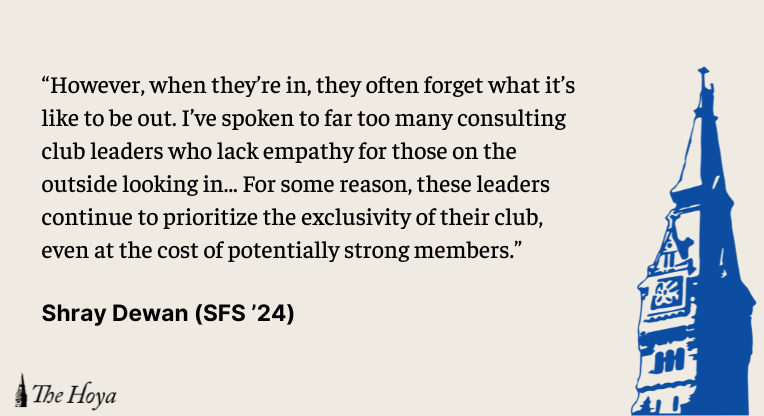For too long, Georgetown University consulting clubs have championed an exclusive culture of low acceptance rates ranging from 15% to a measly 5%. With these rates lower than the university’s own acceptance rate, it is no wonder that students feel immense levels of pressure when applying to these clubs.
During the application process, students face semi-arbitrary interviews evaluating their communication and presentation skills — as well as their “fun factor.” If they pass, the students are in — into the community, the training programs and the coveted exclusivity that comes with having a consulting club on their resume.
However, when they’re in, they often forget what it’s like to be out. I’ve spoken to far too many consulting club leaders who lack empathy for those on the outside looking in. Yet they were in that same position two or three years ago. For some reason, these leaders continue to prioritize the exclusivity of their club, even at the cost of potentially strong members.
This kind of stratification in our community may be easier to discern through a comparison with the beloved dystopian novel series The Hunger Games.
The consulting clubs rule Panem — or in this case, Georgetown — just like the Capitol’s upper echelon, who indulge in extravagant parties and impart wisdom to insiders only. They find satisfaction in viewing those not in their society — the people of the districts — as outsiders, while relishing their own membership.
As the desire to be among the Capitol citizens grows, residents of the districts attempt to win the Games — a multi-step interview process — in exchange for access to newfound exclusivity. Those who are lucky enough to emerge victorious from their trials are elevated in status and are privy to the Capitol’s secrets. Then, the cycle repeats all over again each semester.
However, this toxic cycle might be coming to an end at Georgetown.
Recently, the new McDonough School of Business Student Advisory Board (MSAB) implemented an open-access policy aimed at breaking down barriers to pre-professional clubs. This proclamation would allow any student to join any MSB club as a general member.
Although many students were excited over the prospect of discovering these new clubs, many people in the Capitol were furious.
After unsuccessfully threatening to leave the MSB altogether, many consulting clubs quickly uncovered loopholes in the MSAB Constitution to preserve their status quo of exclusivity. Hilltop Consultants, Innovo Consulting and Georgetown Eco Consultants united to form a shared, but yet-to-be-constructed, training system to share the burden of educating their general members on how to consult.
Other competitive clubs, like Georgetown Global Consulting, simply do not have to follow this mandate because they are not a part of the MSB and can therefore maintain their exclusivity. Thus, the positive change that the open-access policy could create is largely rendered impotent since other consulting clubs are not bound to the same mandate.
Rather than attempting to preserve the competitive club culture at Georgetown, it may actually be more beneficial for all of us to embrace the changes geared toward inclusivity.
For example, Hoyalytics, of which I am the Chief Technology Officer, has completely opened its gates this semester. Anyone considering joining can complete a three-minute form which ends with a link to join the club’s Slack. In the past, Hoyalytics only accepted 20 to 25 students each semester. Since the open-access policy was instituted four weeks ago, Hoyalytics has quickly gained over 300 new members.
Although the club is not as exclusive as it was in the past, it can now take advantage of the benefits of inclusivity. Non-exclusive clubs gain access to a wider swath of students, and prospective members have the opportunity to explore different clubs with flexibility.
In addition, although some leaders are concerned that open-access policies inhibit the social cohesion of their clubs, I argue that the opposite may occur. Prospective members are now more inclined to join and stay involved because of genuine interest, not just for the resume boost.
Frankly, I’m disappointed in the way my fellow club leaders have reacted to these open-access policies. If you believe your club can provide valuable education services, provide them to everyone. If you truly believe that only those who are passionate about your club should become members, allow them to self-select after having the freedom to try out that niche. Not everyone has been exposed to nonprofit or environmental consulting before coming to Georgetown, but that doesn’t mean they cannot succeed in those clubs.
I encourage future club leaders to do better in their policies: be creative and think about the people who want to join your club. Look past your Capitol walls to those in the districts who want to learn and explore — the very purpose of college.
Shray Dewan is a senior in the School of Foreign Service.














